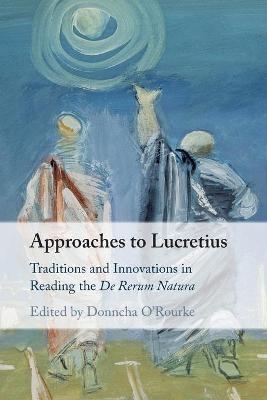
Approaches to Lucretius
Cambridge University Press (Verlag)
978-1-108-43310-5 (ISBN)
Both in antiquity and ever since the Renaissance Lucretius' De Rerum Natura has been admired – and condemned – for its startling poetry, its evangelical faith in materialist causation, and its seductive advocacy of the Epicurean good life. Approaches to Lucretius assembles an international team of classicists and philosophers to take stock of a range of critical approaches to which this influential poem has given rise and which in turn have shaped its interpretation, including textual criticism, the text's strategies for engaging the reader with its author and his message, the 'atomology' that posits a correlation of the letters of the poem with the atoms of the universe, the literary and philosophical intertexts that mediate the poem, and the political and ideological questions that it raises. Thirteen essays take up a variety of positions within these traditions of interpretation, innovating within them and advancing beyond them in new directions.
Donncha O'Rourke is Lecturer in Classics at the University of Edinburgh. He is author of Propertius and the Virgilian Sensibility (forthcoming) and co-editor of Didactic Poetry of Greece, Rome and Beyond: Knowledge, Power, Tradition (2019).
Introduction; Part I. The Text: 1. Critical responses to the most difficult textual problem in Lucretius David Butterfield; Part II. Lucretius and his Readers: 2. Reading the 'implied author' in Lucretius' De Rerum Natura Nora Goldschmidt; 3. Common ground in Lucretius' De Rerum Natura Barnaby Taylor; 4. Coming to know Epicurus' truth: distributed cognition in Lucretius' De Rerum Natura Fabio Tutrone; Part III. The Word and the World: 5. Infinity, enclosure and false closure in Lucretius' De Rerum Natura Donncha O'Rourke; 6. Lucretian echoes: sound as metaphor for literary allusion in De Rerum Natura 4.549-94 Jason Nethercut; 7. Saussure's cahiers and Lucretius' elementa: a re-consideration of the letters-atoms analogy Wilson H. Shearin; Part IV. Literary and Philosophical Sources: 8. Arguing over text(s): master-texts vs intertexts in the criticism of Lucretius Andrew Morrison; 9. Lucretius and the philosophical use of literary persuasion Tim O'Keefe; 10. The rising and setting soul in Lucretius, De Rerum Natura 3 Emma Gee; Part V. Worldviews: 11. Was Memmius a good king? Joseph Farrell; 12. A tribute to a hero: Marx's interpretation of Epicurus in his dissertation Elizabeth Asmis; 13. Plato and Lucretius on the theoretical subject Duncan F. Kennedy.
| Erscheinungsdatum | 28.06.2021 |
|---|---|
| Zusatzinfo | Worked examples or Exercises; 2 Halftones, black and white |
| Verlagsort | Cambridge |
| Sprache | englisch |
| Maße | 152 x 229 mm |
| Gewicht | 457 g |
| Themenwelt | Geisteswissenschaften ► Philosophie ► Philosophie Altertum / Antike |
| Geisteswissenschaften ► Sprach- / Literaturwissenschaft ► Anglistik / Amerikanistik | |
| Geisteswissenschaften ► Sprach- / Literaturwissenschaft ► Literaturwissenschaft | |
| ISBN-10 | 1-108-43310-3 / 1108433103 |
| ISBN-13 | 978-1-108-43310-5 / 9781108433105 |
| Zustand | Neuware |
| Haben Sie eine Frage zum Produkt? |
aus dem Bereich


